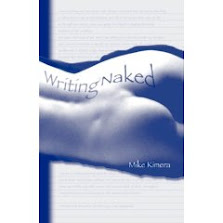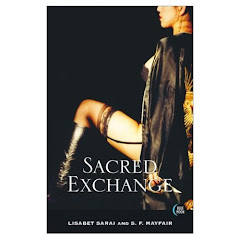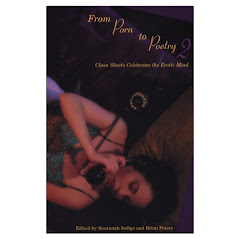It was quite frustrating at first. I would write something that was 220 words long and then have to précis it until it reached the 100 limit.
Of course, it turned out that that largely missed the point. It implies that you write a flasher by cutting things out. I’ve since learned that you write a flasher by condensing what you have to say. It’s a little like “reducing” a sauce in cooking – although there is less volume of sauce at the end, what’s left is much more intense; everything essential to the flavour remains.
Now when I write a flasher, I start with an emotion. Then I move to a situation. I end up with almost as much back-story in my head as I would for a 3,000-word story. Then I try to find the moment that best expresses the back-story and the emotion.
Yeah, I know this all sounds theoretical and not very specific. So let’s get down to examples.
Here’s one I wrote last month.
The woman my lover made me
(c) 2005 by Mike Kimera
I miss his grin when he undressed, spread wide below hungry eyes, mirroring my position, it was both challenge and tribute.
I miss the bruises he left on my breasts, his blood-hot hardness skewering me, his lust flooding me, bursting the dam of my restraint.
I miss the glee in his eyes when I slid his soft-but-stiffening flesh into my mouth, engulfing and resurrecting him.
I miss being his mistress, his guilty secret, his unoriginal sin.
Refusing a life of loss, I grasp my sleeping husband’s sex, ready to discover if he will enjoy the woman my lover made me.
Not easy to read is it. You sort of have to sip at it. Because every word is necessary.
The title is a little luxury – it’s not included in the word count and it sets the mood.
The emotion here is a wistful sadness that turns into brave hope. So how do you do that in 100 words?
To be completely honest, I tinker until it’s right. Then, afterwards, I can see why it’s right.
What makes this flasher work is a structure that tells the reader when to breathe – every new idea start with “I miss”.
And each miss tells you something more about the two lovers and what did for each other.
And, of course, you know they are lovers because the title tells you so.
The first miss is about challenge and tribute – risk and respect.
The second miss is about the robust physical nature of the sex and how it “bursts” through “restraint”.
The third miss shows intimacy and collaboration – she acts, she is not just acted upon – and continues the emotional thread of glee - grinning, conspiratorial happiness.
The fourth miss adds the idea of the illicit and shows complicity. It also shows, by the choice of language, that she is intelligent and introspective and that he is married.
The fifth section flags its difference to the reader by starting with: “Refusing a life of loss”. This tells the reader to slow down, there’s a new idea coming. The “life of loss” idea shows that her lover is gone not just absent. It also shows the strength of the connection.
Then we get “I grasp my sleeping husband’s sex”
This is more complex than it seems. First, we now know she is also married. Secondly, her reverie, her four misses, has been conducting in her marriage bed. Thirdly, there is something deeper in “my sleeping husband’s sex” that would not be there if the word sex was replaced with cock or if her husband were awake. “my sleeping husband’s sex” suggests perhaps a reason why this married woman had a lover – because her husband’s sex slept?
Finally, we get “ready to discover if he will enjoy the woman my lover made me”.
If we unpack this, we get her been active and brave “ready to discover” then the focus moves from her to him. Her question is whether he will enjoy. Then we understand that, whether he enjoys it or not, she will always be “the woman my lover made me”
Which get us back to the title and balance all that she misses against all she’s become. It is this pivot point in her perception of herself that this little story is really about.
OK, either I’m full of it or these flasher things have got something going for them.
After I wrote this one I got some feedback saying how little is written about what happens after an affair is over and the marriage continues. It stuck with me, so this week I wrote a companion piece.
(c) 2005 by Mike Kimera
Waking to find my shy wife taking me deep into her mouth, I know her lover, the man who taught her this, has left her.
The first bruises he left on her breasts inflamed my envy. I, with my over-careful love of my perhaps-too-young wife, had never lit the fires her ungentle lover kindled.
Always, I met her shy lust with gratitude not the passion she craved, holding myself back, afraid to hurt what I cherished.
She looks up, a question in her eyes.
In answer, my fingers push roughly into her wet sex, stoking the embers he left behind.
The emotion here is regret turning into hope – similar to the first one but here the regret is for something not done. And that difference defines the piece and the relationship between husband and wife.
This piece is meant to be harder to read. It doesn’t have the clean lines of thought that the wife had. This is an older man who thinks in complex sentences that sit at a distance from direct experience.
The first sentence tells you he isn’t a straightforward man. What kind of man wakes from sleep to find his shy wife has him in her mouth, and reacts with neither pleasure nor surprise but with deductive logic? And what is implied both by the fact that he knew she had a lover and that he knows that she will only reach out to him like this if the lover has left? This is a man who thinks before he acts, and probably while he’s acting.
The second sentence then twists the reader a little. The bruises on the breasts, something that the woman “missed” in the first flasher, become the source of envy, not jealousy or concern or wrath.
The next sentence shows a man who expresses himself by what he is not or can not or does not “over-careful”, “Perhaps-too-young” “ungentle lover”
Then we get his view of why the sexual part of the marriage has failed – his fault not hers – no reproach for her having the affair, only to himself for creating the need for it.
The last two sentences move from past to present and finally this man finds his way from thought to action.
OK, so, any lessons learnt from this perhaps-over-long examination of 200 words of text? J
Here are a couple of takeaways:
Try out writing flashers. If you write nothing else in October, write at least one of these. It is an excellent way to focus your writing, especially your imagery and use of tenses.
For me at least, writing happens by feel. Analysis is strictly ex-post. But being able to do the analysis helps to sharpen what you know intuitively
Now, for those of you still reading, take a look at a couple more flashers and work out for yourself what makes them work (or what would make them work better).
I still...
© 2004 by Mike Kimera
I still lie on my side of our bed
curled ‘round your old shirt
scavenging your scent
sustaining my memory
I still feel your heat pressing into me
when I’m lying on my belly
letting my fingers
take your place
I still open my legs and offer my mound,
to your soft, skilled tongue,
trying to summon
a remembered caress
I still rage at you for leaving me alone,
gnawed at by fierce hungers
that you awoke
which never sleep
I still reach out for you when I wake
puzzled anew by your absence
slow to remember
your pointless death
Tryptych
(c) 2002 by Mike Kimera
My tongue lops his just spent seed from her swollen sex. It is a ritual with us: part blessing, part penance, part pleasure.
We have so many parts.
I was already his wife when we took her to our bed, believing ourselves predators, although she knew we were prey.
When I first shuddered to joy on her fingers, we all three knew I was hers forever.
My desire for her remains urgent, painful, insatiable.
She could have taken me away but she chose to stay with him, becoming our sole connection, our shared obsession, the hinge of our lust.


 There are some classic set pieces: Inke’s face as her boyfriend works away on top of her and she’s not-so-patiently-waiting for something interesting to happen or her reaction to her first (accidental) orgasm, brought on by riding her bicycle (see picture above). Or the revenge taken by Lena (the redheaded girl) on a loutish friend who embarrassed her publicly (she feeds him two Viagra tablets telling him that they’re e. He spends the evening so erect that he can only pee in the urinal if he does a handstand).
There are some classic set pieces: Inke’s face as her boyfriend works away on top of her and she’s not-so-patiently-waiting for something interesting to happen or her reaction to her first (accidental) orgasm, brought on by riding her bicycle (see picture above). Or the revenge taken by Lena (the redheaded girl) on a loutish friend who embarrassed her publicly (she feeds him two Viagra tablets telling him that they’re e. He spends the evening so erect that he can only pee in the urinal if he does a handstand).















